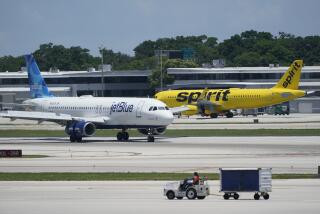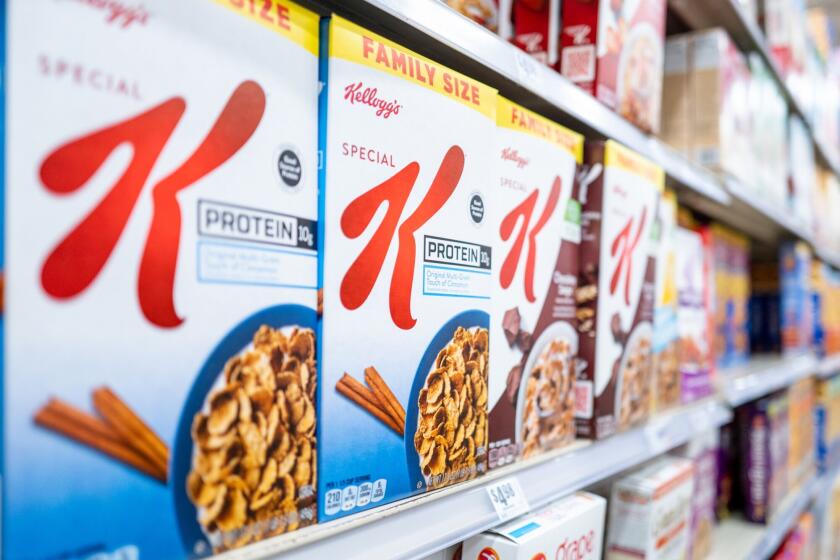Orbitz sites, Enterprise car rental brands cut ties
- Share via
Orbitz, one of the world’s leading travel websites, is at the center of another pricing dispute — this time with the world’s largest car rental company.
Last year, the nation’s third-largest airline, American Airlines, stopped posting its booking data on Orbitz after the two got into a dispute over fees that American had to pay to be listed on Orbitz.
Now Enterprise Holdings Inc. has announced it is no longer doing business with Orbitz because of a fee feud.
Enterprise Holdings, which operates the Alamo Rent a Car, National Car Rental and Enterprise Rent-a-Car brands, issued a statement saying it ended its relationship after Orbitz demanded “unacceptably high commission rates” and removed Alamo and National from the website and from its companion site, CheapTickets. (Enterprise had not been listed on Orbitz.)
“We believe the stance being taken by Orbitz violates the best interests of consumers, our company and our industry,” said Pam Nicholson, president of Enterprise Holdings. “Effective April 1, none of Enterprise Holdings’ three brands will be listed on Orbitz.com or CheapTickets.com.”
Orbitz spokesman Brian Hoyt told a different story. He said it was Orbitz that dumped Enterprise, not the other way around.
The rental agencies were removed from the website because their contracts expired March 31, Hoyt said. He added that Orbitz received better offers from Dollar Rent a Car and Thrifty Car Rental to fill the online slots.
Dollar and Thrifty are owned by Enterprise’s chief rival, Dollar Thrifty Automotive Group Inc.
He also said there was no connection between the quarrel with Enterprise and the dispute with American Airlines.
“This is apples and oranges,” he said. “Night and day.”
• Delta speeds up baggage check at LAX
Anyone who has traveled lately on Delta Air Lines from Los Angeles International Airport may have noticed that the lobby at the ticket counter is roomier and the lines move a bit faster.
The improvements are the result of a new baggage screening system completed in November by Siemens Industry Inc.
The technology and engineering company moved the screening process behind the counter so that passengers no longer have to lug their bags to a separate Transportation Security Administration station.
Now, passengers leave their luggage at the ticket counter and head for their gate.
During a behind-the-scenes tour of the terminal, Siemens officials said the system relies more heavily on automation than the previous operations and uses electronic luggage-tag readers to keep track of the bags as they move along conveyor belts and ramps.
Thomas Bayer, Siemens’ head of infrastructure logistics, said the company may soon be able to provide tracking information for passengers about the location of their luggage at all times.
Via email, he said, passengers could get reports on the movement of their luggage from the point it gets to the ticket counter until it enters the airplane.
Of course, the tracking service probably will not be free. It may be offered, Bayer said, for an extra fee of $5 or so.
• Spirit Airlines keeps adding fees
When it comes to airline fees, Florida-based Spirit Airlines has been out in front of the industry.
It was the nation’s first airline to charge passengers up to $45 to bring carry-on luggage into the plane and one of the few carriers to charge $3 for soft drinks and bottled water.
Spirit has now lowered its maximum weight for checked baggage to 40 pounds from the industry standard of 50 pounds. The new weight limit took effect Feb. 1.
Passengers who check a bag that weighs 41 to 50 pounds must pay $25 in addition to the checked-bag fee of up to $38 for domestic flights. Heavier bags incur even bigger fees.
Spirit spokeswoman Misty Pinson said the lower weight limit helps the airline save money and thus keep fares low.
She added: “We are also interested in reducing workplace injuries and strain on our valued employees who assist our customers in moving thousands of bags every day.”
More to Read
Inside the business of entertainment
The Wide Shot brings you news, analysis and insights on everything from streaming wars to production — and what it all means for the future.
You may occasionally receive promotional content from the Los Angeles Times.










